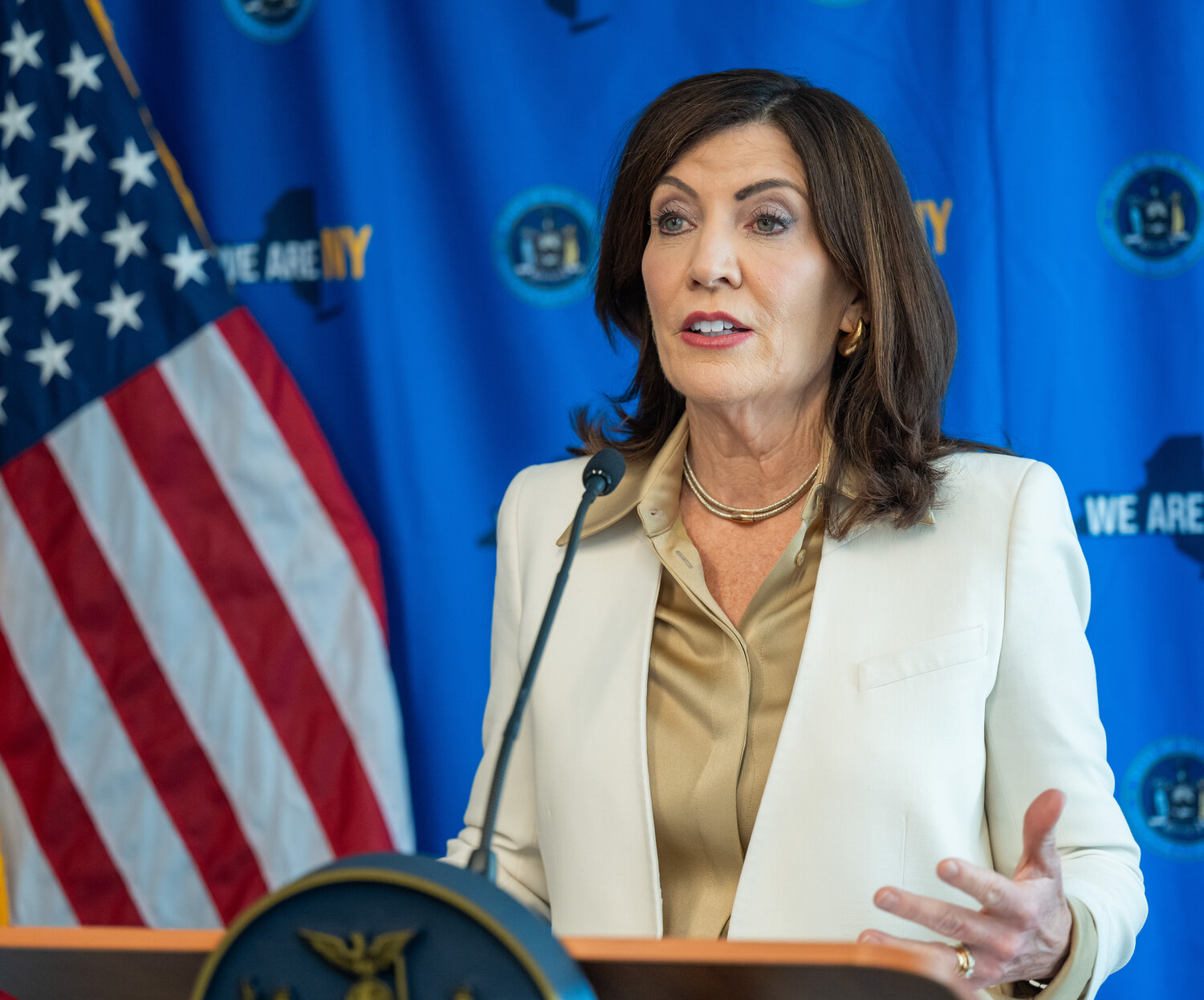Saturday, April 27, 2024
Voting year for local elections shifts to 2026

Gov. Kathy Hochul recently signed legislation aligning many odd-year local elections with statewide and legislative elections that are held in even-numbered years.
Hochul said she believed the bill would expand access to voting, and make it easier for New Yorkers to vote in local elections that directly impact their lives and the communities they live in.
The change will begin in 2026. Elections for county executive, county legislatures and town board seats will be held at the same time as the voting for state and federal offices.
The bill has been met with opposition from Long Island Republicans, who say the shift will take the focus away from local candidates and drown out local issues.
Town of Heampstead Councilwoman Laura Ryder, of Lynbrook, said in a statement to the Herald that the bill is a “shameless power grab that will silence the voice of people at the town and county level.
“The scheme will effectively end local elections and eliminate discussion of the neighborhood and community issues, overshadowing those conversations with national and statewide topics.”
Assemblyman Brian Curran, who represents Lynbrook and East Rockaway, also disagreed with the legislation, saying that local issues will get lost on the ballot among the high-profile issues.
“Federal and state issues are going to definitely overshadow any local, town and county issue, which is just as important, if not more important, than some of the federal and state issues,” Curran said. “I mean, how is Supervisor Don Clavin supposed to get any type of recognition on an issue when he’s going up against a presidential election day, a Trump-Biden election? It’s almost impossible.”
According to the state, holding elections in odd-numbered years increases the cost of participating in the voting process, particularly for voters who may have a difficult time arranging for time off from work and traveling to their polling sites.
“Democracy works best when all eligible voters can participate, and this new law advances New York State toward that goal,” read a statement from Albany. “Other states and jurisdictions around the country have made similar common-sense adjustments to their election calendars and have subsequently seen significant increases in voter participation in local elections.’
The bill also aims to increase voter turnout, which is historically much lower in local election years. Millions more New Yorkers took part in elections in 2020, with voter turnout at roughly 64 percent. In 2021, just 25 percent of eligible voters turned out to take part in local elections around the state.
“Every eligible New Yorker deserves the right to participate in the democratic process without unnecessary barriers,” Hochul said. “By signing this legislation, we are taking a significant step towards expanding access to the ballot box and promoting a more inclusive democracy. This is a meaningful first step and I would support a constitutional amendment to align all election years, to save taxpayer dollars and avoid voter fatigue.”
Nassau County Assemblyman Ed Ra questioned whether further voting accessibility is needed. “I know a lot of people have talked about making the elections more accessible, but the fact is, at this point, we have 10 days early voting regardless of whether it’s an odd or even year,” he said. “We have more liberalized mail and absentee voting than we’ve had in the past. So, you know, the access is there for people to vote.”
Other county Republican leaders remain skeptical about whether moving election years will truly increase the notoriously low turnout for local elections.
“There is a historical finding that there is a thing called ballot dropoff — that the larger the ballot is and the more numerous candidates there are, there are more people that do not finish the ballot,” Curran said. “You also have to factor in the historical fact of ballot dropoff.
“I think all of this is just the Democrats trying to put a very heavy hand on election outcomes in every way that they can,” he added, “and this is just another step in doing it.”
Assemblywoman Michaelle Solages, a Democrat who represents the 22nd District, which stretches from Valley Stream to Floral Park, said that as representatives of diverse communities, the legislative caucus dedicated to ensuring that every New Yorker has the opportunity to exercise their right to vote and participate in democracy.
“By streamlining the election process and aligning it with a period of heightened civic activity, New York state aims to strengthen voter engagement and empower disadvantaged communities to select accountable representation at the local level,” Solages said in the state’s release. “There is no doubt that this legislation is a positive win for the people.”
—Additional reporting by Nicole Formisano
HELP SUPPORT LOCAL JOURNALISM
The worldwide pandemic has threatened many of the businesses you rely on every day, but don’t let it take away your source for local news. Now more than ever, we need your help to ensure nothing but the best in hyperlocal community journalism comes straight to you. Consider supporting the Herald with a small donation. It can be a one-time, or a monthly contribution, to help ensure we’re here through this crisis. To donate or for more information, click here.
Sponsored content
Other items that may interest you







